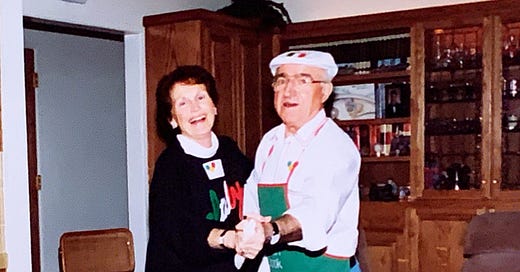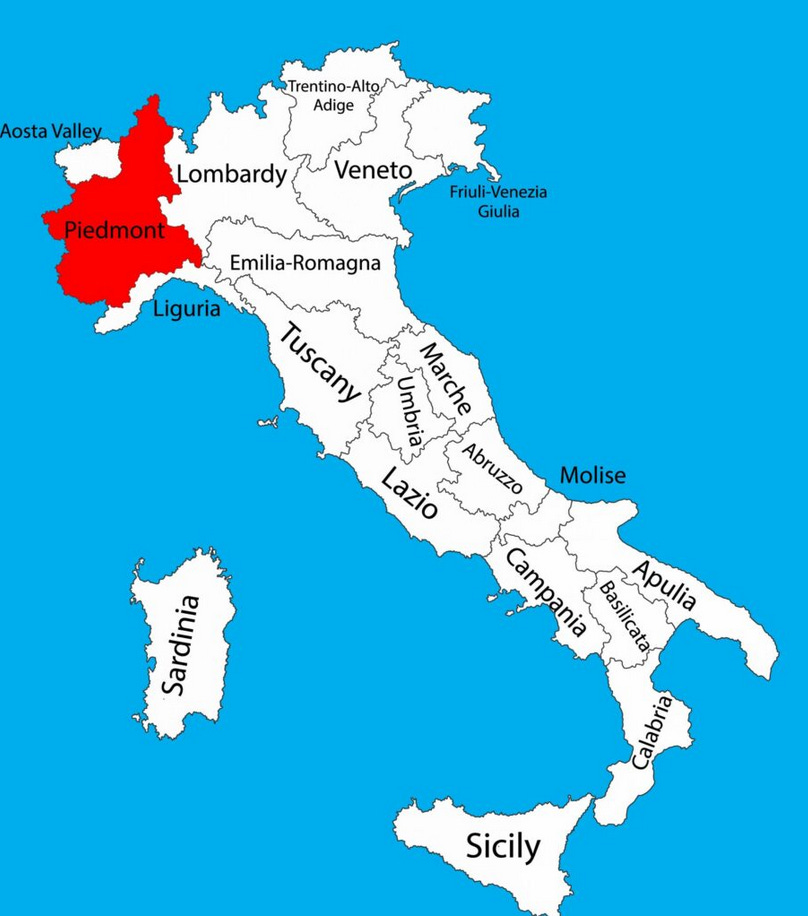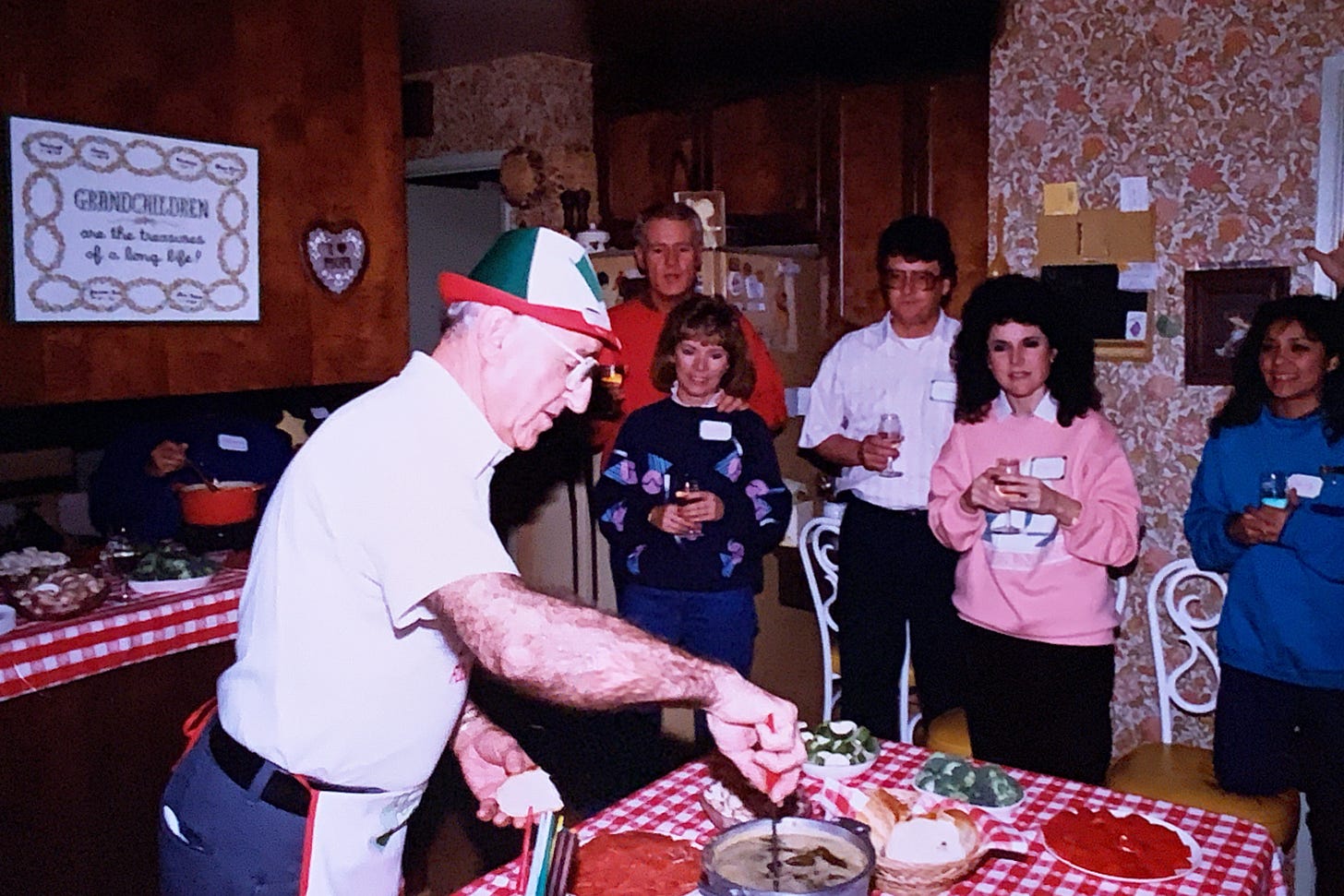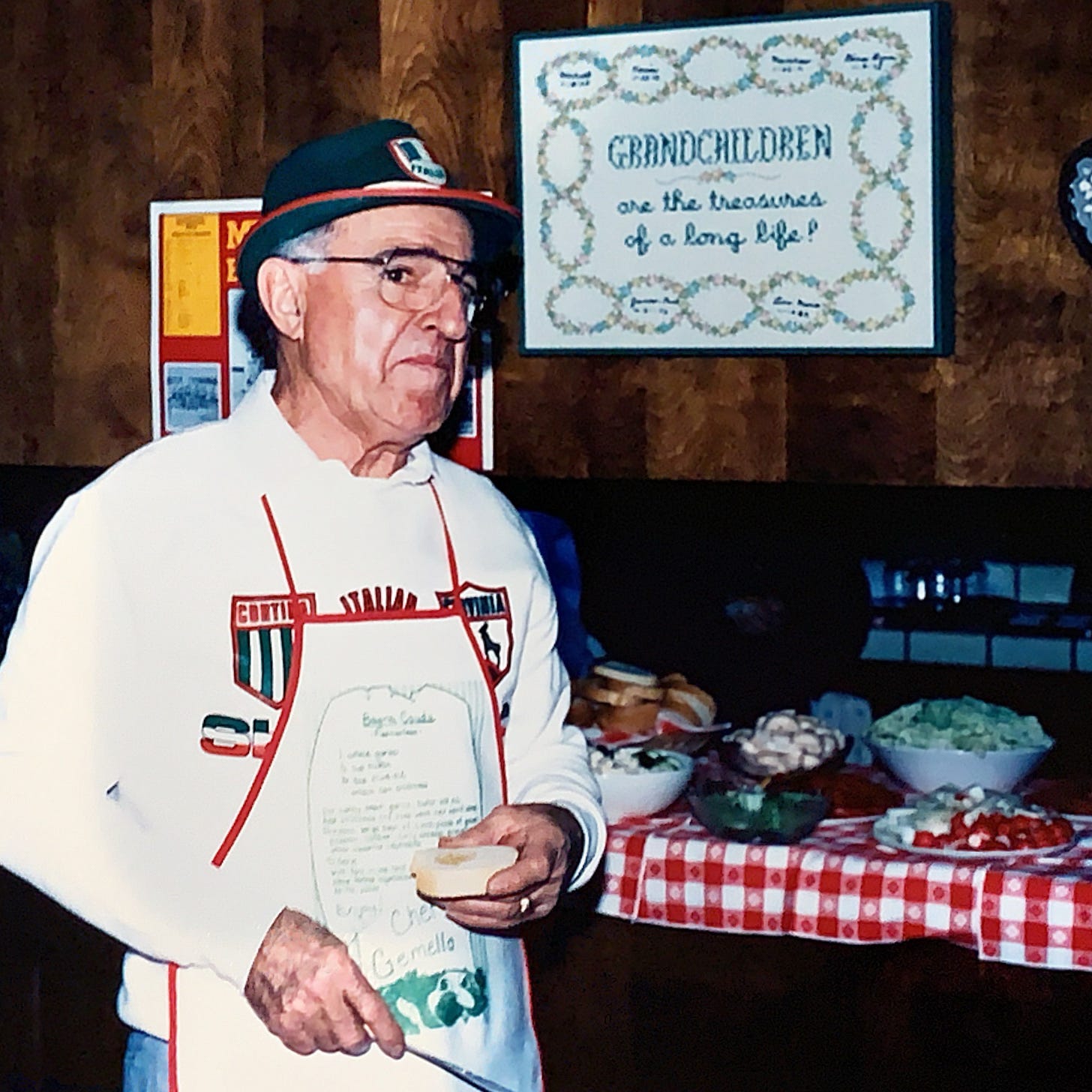Bagna Càuda Night
My grandfather’s joke-telling skills were always in full boom on Bagna Càuda Night, an annual family tradition.
👋 Hello, I’m Kevin Ferguson and welcome to 🍷 Rain on the Monte Bello Ridge,🍷 a memoir about health, aging and winemaking. (Book summary) 🍇 This is my newsletter. It includes book research and early release chapters about winemaker Mario Gemello and his centenarian widow, Kay Gemello. 📖 They are my lovable maternal grandparents. You can subscribe by clicking on this handy little button.
Below is a middle chapter. Hope you enjoy it!
Bagna Càuda Night
Grandpa Mario Gemello’s 1963 European trip of Soviet wineries was capped off by a week-long visit to his parents’ native land of Piedmont, Italy. His uncle Charlie, who was born in Piedmont, but had lived in California for the past several decades, met him there.
Charlie took him around to meet his friends from the “Old Country,” as well as visit Moncucco, the small town where his mother was born, and his parents met as young teenagers.
Mario passed away in 2005, but combing through his travel journal of Europe recently brought back vivid images of my grandfather and the way his humor would make us laugh on a daily basis.
The travelogue’s first page asked for the traveler’s identification information, most of which my grandfather didn’t bother to fill in. He listed his name and Mountain View address. Occupation: Winemaker. However, most of the physical descriptors - height, weight, color of eyes - he left blank. The one exception, “hair color,” he wrote: Some (None).
Even in a personal journal, likely to be consulted by only himself, he’d crack self deprecating jokes.
His joke-telling skills were always in full boom on Bagna Càuda Night, an annual family tradition back home in California, that originated in Piedmont and was continued by his parents. For such a night, we would all gather around three or four simmering fondue-type pots, but instead of cheese they’d consist of a mixture of garlic, anchovies, olive oil and butter. Plates of veggies and thinly sliced meat1 were ready to be dipped in the sauce before eating.
In Piedmont, bagna càuda was known as poor man’s food, because “we would dip anything we grew in the garden in it,” Great Grandpa John Gemello would often tell us.
Actor Stanley Tucci featured bagna càuda on his CNN travel show, Stanley Tucci: Searching for Italy.
“Oh my God. That is amazing,” Tucci said after biting into a celery stick dipped in bagna càuda at a family-run Piedmont restaurant. “If I smell like garlic, I don’t care.”2
The tradition in my family was to celebrate Bagna Càuda Night in September around my grandfather’s birthday. As we would arrive, my grandfather would greet us in his “Bagna Càuda” apron with “Chef Gemello” adorned below his chest.
Unless you were a rookie, you’d come dressed in clothes, conveniently ready to be tossed in the wash to remove the garlic and anchovy smell afterwards. (Translation: no dry cleaning).
Mario’s Bagna Càuda Night was a dining experience for the food and endless glasses of wine, but it was also memorable, because of the stories he would tell throughout the night.
It ended in the mid 2000s, as my grandfather battled with prostate cancer. He died on Halloween in 2005. I thought about him every day for months if not longer, which was common in the family. I recall my brother, Mike, saying the same thing.
My grandmother spent a good part of the next year in grief counseling. She had not only been married to my grandfather for 64 years, but she had known him since she was in the second grade.
The following year as my grandfather’s first birthday after his death approached, I asked my mom if Grandma Kay would be uplifted if we would bring back Bagna Càuda Night in Grandpa’s honor. My mom said it was too soon.
“That would be hard on Grandma, because it was an event they would host together,” Mom said.
Instead of Bagna Càuda Night, Grandma started a new tradition in September, having a mass said in his honor at her local church around his birthday.
Then one Sunday evening in January of 2012, I arrived at my Mom’s home expecting a small group - six or eight - of relatives for a birthday dinner. I was turning 40.
I walked in to the smell of garlic. A strong amount. As I entered the living room, I was surprised to see a bigger than expected group. Some of my good friends had been secretly invited to celebrate my fortieth birthday dinner.
“Surprise!” They shouted.
Bagna càuda simmered on a hot pot on the peninsula kitchen countertop that separated the dining area. Plates of vegetables and meats surrounded the hot pot.
Grandma Kay, at a youthful 91, stood by gripping her cane and smiling.
“Are you surprised?” she asked, as I leaned in to give her a hug and a peck on the cheek.
“My God, the first Bagna Càuda since Grandpa’s passing. Of course!” I said.
What an amazing and unexpected gift.
Bagna Càuda Night was back, at least for one night. And so were many of the stories that we had always loved to share about Grandpa Gemello.
It’s cathartic to tell stories about a deceased loved one, according to Dick Ebersol, longtime TV executive and author of the memoir, From Saturday Night to Sunday Night: My Forty Years of Laughter, Tears and Touchdowns in TV. In it, he addresses coping with the loss of his 14-year-old son, Teddy, from a 2004 plane crash.
While a teenager’s life being cut short from a freak accident is not quite the same as a grandfather or a spouse of 64 years dying of cancer, the people who lose loved ones in either event do feel pain. One way to turn the pain into a positive, Ebersol said, in a TV interview, is to live vicariously through the retelling of favorite family stories.3
“It means that you don’t have to give up on someone who was such a part of your life, just because they physically aren’t there anymore. There are memories to be cherished forever and to be discussed forever.”
Do you like this newsletter?
Then you should subscribe here:
In the Piedmont tradition, bagna càuda didn’t include meat. However, Grandpa Mario added it to the menu to satisfy his Northern California carnivorous friends and family members.
Stanley Tucci featured bagna càuda on the Piedmonte episode, when he visited Piola de Celso, a family-run restaurant, in Turin.
Dick Ebersol’s comments came from a 9/27/22 interview on Late Night with Seth Meyers.








It's a tradition every new year for our family, and the stories are the best! I'm glad you footnoted that meat is not traditional because I had never heard that. But also.....butter?!? For real? Sounds like a travesty to me. We stick to garlic, olive oil, anchovies, and a dash of cream. Served with all kinds of veggies. I heard stories that it was best (or at least very traditional) with cardone (cardoon in English) but I've never seen that sold here so have never tried.